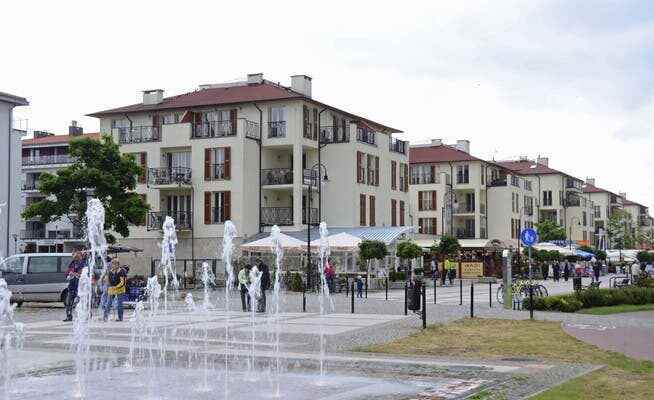The example of Poland shows how painful the turnaround in interest rates can be. Many borrowers there have taken out mortgage loans with variable interest rates. Because the central bank has to fight inflation, these have become massively more expensive. The government is helping, which outrages economists.
Anyone who has bought their own home in Poland suddenly has to pay a lot more for it because interest rates have risen rapidly.
The high rates of inflation are making Poland’s government increasingly nervous, and it is reacting with measures that are sometimes causing outrage. What the government is doing is ridiculous, says economist Piotr Kuczynski from the Warsaw investment firm Xelion.
The “credit holidays” that have been in effect since the beginning of August are causing a stir in the financial sector. Debtors who have taken out a mortgage in złoty and live in their own property can suspend interest payments for four months this year. They also have the right to such a deferral in the coming year.
With the watering can principle
Because the interest payments are only deferred, the banks should not lose any money in the medium term. However, they are missing out on a huge amount of liquidity; Prime Minister Mateusz Morawiecki estimates the amount at 20 billion zlotys (4.19 billion euros).
However, that is not the only thing that bothers the economist Kuczynski about the “credit holiday”: he also dislikes the fact that the government applies the watering can principle: Debtors benefit from the suspension of interest payments regardless of their financial situation. It is also forgotten that many property owners have benefited greatly from the previously very low interest rates.
However, inflation is an even more serious problem in Poland and other central European countries than in the western part of the continent. Inflation rose to 15.6 percent in June. The central bank is attempting to combat the dramatic surge in prices by pursuing a monetary policy course that is considerably tighter than that of the European Central Bank.
The key interest rate is now 6.5 percent, the highest level in 17 years. For the Poles, this steep climb comes as a nasty surprise. After all, the head of the central bank, Adam Glapinski, had declared in 2020 that no higher interest rates were in sight. Like all central bankers, he was wrong.
Steep rise in mortgage rates
For Poles with a relatively low income, the central bank’s fight against inflation is becoming an increasing problem. This is due to the fact that, according to Kuczynski, around 90 percent of mortgage loans have a variable interest rate. The financial institutions use the Wibor short-term interest rate (“Warsaw Interbank Offered Rate”) as the basis for calculating the interest rate, to which they add a margin. Since last October, the Wibor has jumped from 0.2 percent to just over 7 percent. So home ownership has become a lot more expensive in Poland.
The government is obviously concerned about the economic and social upheaval that could result. The economist Piotr Arak from the Polish Economic Institute points to a connection that is not obvious at first glance: In the country, credit providers are currently very aggressively promoting short-term consumer loans. “There is a risk that borrowers will take on additional debt with these providers to pay the mortgage interest,” he says. This danger alarmed the government.
For them, high inflation is all the more of a problem as elections are due to take place in autumn 2023. Everything is already pointing to a dirty election campaign between the ruling Law and Justice party (PiS) and the liberal-conservative Civic Platform (PO) led by Donald Tusk.
threats against banks
The former President of the European Council wanted to support mortgage borrowers even more than Prime Minister Mateusz Morawiecki. He proposed freezing mortgage interest rates at December 2021 levels, without saying whether the state or banks would have to pay for the difference between the market interest rate and the cap.
With this idea, Tusk took Hungary’s Prime Minister Viktor Orban as a model, for whom he otherwise only has contempt. Mortgage rates have been capped in Hungary since the beginning of the year.
Apparently Poland’s government didn’t want to go that far, although, according to Arak, the medium-sized mortgage debtors are seen as swing voters who want to get both political camps on their side.
However, Morawiecki takes a harsh stance on the financial sector. Any attempt by the banks to thwart the government’s action would be punished, the prime minister threatened this week. “I see the first semester results of the banks, they are very good, so we don’t have to feel sorry for them.”
Morawiecki was once a banker himself, says Kuczynski from Xelion. “That’s why he knows well that the banks are not the darlings of the population.”
